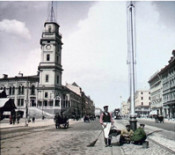
New city regulations approved
June 11 (23), 1892, Emperor Alexander III gave the Senate his personal imperial decree promulgating the new city regulations. The decree stated: "The City Regulations of June 16, 1870, issued by the will of our deceased parent, brought an important benefit within twenty years of its application. Improvement of urban settlements has risen considerably, and many conditions of urban life improved. But along with these favorable phenomena, the structure and activities of urban institutions showed imperfections requiring correction." Minister of Internal Affairs was instructed to revise the Regulations of 1870.
A new government policy based on the theory of local self government, which replaced the social theory, was aimed at weakening the elective principle in urban institutions, limitation of their autonomy and their inclusion in the system of state authorities. Work on the Regulations began in 1890 and was completed in the spring of 1892.
The structure of the municipal government according to the city regulations of 1892 remained basically unchanged in regards of Regulations of 1870. Range of activities to be under their jurisdiction in general corresponded to those defined in 1870. However, the Regulations of 1892 no longer mentioned the independent actions of public administration. Changes also affected the legal status of municipal government officials. Head, council members and city secretary (secretary of the city council) were considered to be in the public service.
Competence of the governor on public management was expanded: instead of the right to supervise, Article 11 charged the governor with controlling the correctness and legality of the actions of municipal public management. In addition, the list of activities that required the approval of the Interior Minister or the Governor was enlarged. Resolutions of the city council could enter into force no earlier than two weeks after their approval, if the governor would not stop their implementation. If earlier the execution of the council order could be suspended if it was recognized illegal, now it could also be recognized impractical, that is not relevant to public benefit and violating the interests of the local population.
Setting of a high electoral qualification led to a sharp reduction in the number of electors, as a result, there was no need of the classified system of elections. Thus, the number of voters in St. Petersburg decreased from 21, 000 to 8, 000; in Moscow - from 20, 000 to 7, 000; in Chernigov - from 1461 to 300, etc.
Number of members of the city councils was reduced and equaled to 20 in urban areas with no more than a hundred voters, in capitals - to 160, in provincial cities with a population over one hundred thousand people and in the city of Odessa – to 80; in other provincial cities, regional cities and those making part of the city government – to 60; in others – to 40. In small towns, where the application of the regulations in full was recognized impossible for lack of funds and the extent of development of trade and crafts, the so-called simplified urban public management was introduced including assemblies of commissioners instead of city councils and city elders instead of mayors.
As well as the Regulations of 1870, the city regulations of 1892 were introduced gradually and were not applied to the entire territory of Russia.
Lit.: Виноградов В. Ю. Становление и развитие городского самоуправления в России в 1870–1914 гг. М., 2005; Нардова В. А. Городское самоуправление в России в 60-х – начале 90-х гг. XIX в. Л., 1984; Немчинов В. И. Городское самоуправление по действующему русскому законодательству. М., 1912.
From the Presidential library materials:

